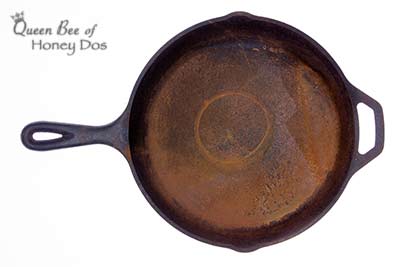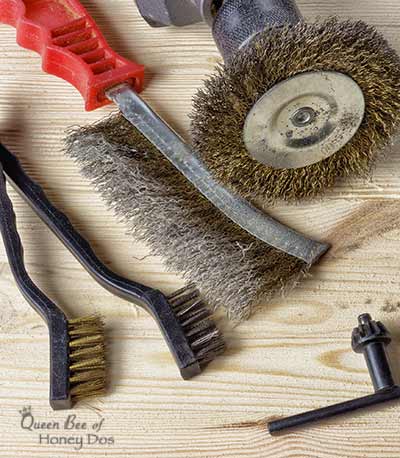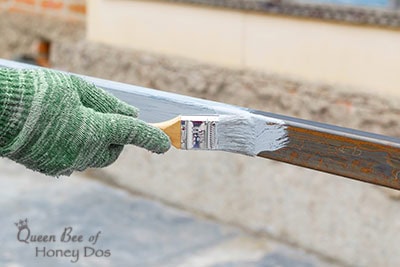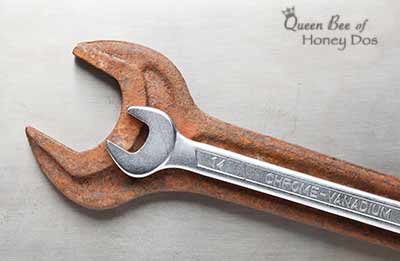I think you would agree with me that rust is a nuisance that we can all live without. The good news is that there are simple and effect ways to give rust the old boot. But, how you deal with that rust should really depend on the type of item that has rusted. As much as I love vinegar, you can’t just use it on everything, or at least you shouldn’t. Tailoring your treatment to the specific situation can mean the difference between a renewed item or a destroyed one. In this post, I will explain how to remove rust from practically anything.
(This post may contain affiliate links (*). That means that I make a small commission from sales that result through these links, at no additional cost to you. You can read my full disclosure here.)

When it comes to removing rust, there are two steps that you must consider – restore and protect. Obviously, we would first have to come up with a way to restore the item back to its pre-rust state, or as close to that as possible. Once that is achieved, we need a way to protect the item from forming more rust in the future. Below are several common problem areas and how to correct them, broken down by the best methods.
How to Remove Rust from Common Household Items…

Use Vinegar:
Since I already mentioned vinegar earlier, let’s just get into the nitty-gritty of using it to remove rust. Yes, it will remove rust, if given enough time. You can soak just about anything in vinegar (usually for several hours) and it will eat away at the rust. However, vinegar will also eat away at metals and some types of stones. So, you will need to weigh the benefits against the risks.
For the best results, use vinegar to soak items like glass, ceramic or porcelain. These items can develop rust stains when a wet, metal object is left in close contact for a long length of time. They will not be harmed by the vinegar, and can be left to soak until the item is completely clean.
Use CLR:
One of the most used rust removers that is used for interior cleaning is CLR.* This is great for rusty surfaces that can’t be soaked in vinegar, such as fiberglass showers and doors. It also states that it is safe to use for cleaning a coffee pot, but personally, I have never used it on anything from which I eat or drink. I recommend using vinegar for those situations. In addition, there is a long list of items that their website says you should not use this product on, including: natural stone, aluminum, Corian, Formica, and steam irons. Just to name a few.
How to Remove Rust from Cast Iron Pans:

My cast iron pan is my very favorite, cooking device. Its use is second in line only to my Pampered Chef stoneware. I am very diligent about keeping it in tip-top shape. But, occasionally it will get left to soak in the sink, where it is sometimes forgotten. I’ve had a few instances where I needed to remove some rust.
(But Wait!……….)
Remember what I said earlier about vinegar on metals. Well, I am sure that you have seen all over the internet how you can clean your cast iron pan with vinegar. Sure, you can do that, and it will definitely remove the rust. However, you are also subjecting your cast iron to unnecessary damage. If left long enough, irreversible pitting will occur.
Luckily, I live in the wonderful state of Tennessee, the same good old state that brings you your Lodge Cast Iron pans.* So, I decided to get my advice straight from the horse’s mouth – or more accurate, straight from the Foundry. They say that the proper method to remove rust from a cast iron pan is to first, dry scrub it with a steel wool scrubber. Then, using a bit of soap and water, scrub it with a nylon or soft scrubber.
Once all the rust has been removed, its time to move on to protecting your pans from more rust. For that, you will simply need to season your pan again. This will restore the coating that was removed during the rusting and clean up phase.
How to Remove Rust from Exterior Surfaces…

With exterior surfaces, the need to follow up with a protective layer is vital in preventing the rust from reoccurring. In most cases, this will mean that you need to apply some rust resistant paint* after the rust has ben removed. The most common methods for exterior surfaces are listed below.
Wire Brushes:

There is nothing that beats a good scrubbing to remove rust. I have always kept a good wire brush* on hand for those early signs of surface rust. A few quick strokes and the rust is gone. You can also use wire brushes in conjunction with a chemical for even quicker treatments.
For those areas that are a bit deeper than just surface rust, I generally use wire wheel brushes.* They make fast work of rust, but can not be used on all surfaces. You can even get wire bottle brushes* in all different sizes. I have a set of varying sizes that I use for cleaning cylinder shaped areas.
Naval Jelly:
When my fencing develops rust in and around crevices, I always go with naval jelly.* It is thick enough to stay on vertical surfaces, and I can apply it and let it set. It also does not evaporate like other rust removers. Once it has done its thing, I wash it away and follow-up with my manual wire brush to remove any remaining bits.
Sand Blasting:
For seriously rusty surfaces, you may want to consider sand blasting. It is quick but also the most costly. At my first home, I had an iron deck which was covered in rust. I had it sandblasted and then repainted it with some rust proof paint. It made the once unusable deck into a nice little outside space, and was much easier than ripping it out and replacing it.
Convert Instead of Removing:

There are a few products out there that can be applied directly over rust, and they will prevent the rust from spreading. It goes on just like primer. What’s more, you can paint right over the converter once it has dried. The one that I prefer is Corroseal.* It is perfect for covering rust on pieces that are too complex to remove yourself. Great for iron chairs, tables, and outdoor gear. Just make sure to wear gloves when applying this stuff, because it is difficult to clean from your hands.
How to Remove Rust from Tools and Gears Parts…

Tools and gears should not be handled the same way that other items are handled. You wouldn’t want to put CLR on anything that will be exposed to gas or oil. Likewise, I wouldn’t recommend soaking a rusty lock in vinegar.
Boeshield VS WD40:
Some people prefer to use WD40 to remove rust from tools and other devices. I have tried it, and in a pinch, it will work on lightly rusted items. However, my preferred product is Boeshield. They have a rust removing product as well as a protection product. The protection product (Boeshield T-9*) is actually the bomb for preventing rust on tools. It is one of my 10 workshop must haves. But, the rust remover is perfect if you first need to get rid of some rust.
I use it on hand tools as well as power tools (table saw, locks, hinges, all hand tools, etc.) . If you buy their kit,* you will not only get the rust remover and T-9, but you will also get a resin, gum and pitch remover to help keep your saw blades in perfect condition. And, perfect cuts begin with good blades.
Final Comments…
Now, I am sure that someone is going to read me the riot act for saying to not use vinegar on some of these items, and instead recommending other chemicals. Just understand that I am not anti vinegar. On the contrary, I love it in so many ways. I use it to help keep my washing machine fresh and to keep my wood floors clean. And, if you want to use it to take rust off of your cast iron or even your stainless steel, please feel free. But, I try to only post accurate information, and I would remiss if I recommended it as a catch-all, without pointing out the possible pit falls.
If you have any special tricks that you use to remove rust, please feel free to let me know in the comments section. I am always interested in learning new techniques. :-)

– PIN IT –

– PIN IT –






Jess says
What would you recommend for cleaning the rust out of a garbage disposal? My husband and I just moved into our first house and although the disposal works perfectly fine it’s fairly easy to see down the drain and looks horrible. Any advice would be greatly appreciated!
Rachel Lynn says
Once a garbage disposal becomes too rusted, it will need to be replaced. Since yours is still working, you can try making a paste from lemon juice and salt or vinegar and salt. Make sure it is thick enough to not drain away but still wet enough to saturate the area. Dump the mix into your disposal and let it sit overnight. Then, add in a few ice cubes (or lemon slices if using lemon juice) and turn it on. You may need to do this a few times if it is really rusted.
Jess says
Thanks so much for your response, I’ll definitely give it a try!
Debbie says
Do you have any suggestions for removing rust from marble? I have tried baking soda paste with vinegar. Lemon juice wasn’t better. The stains have lightened but are still obvious. Any suggestions would be appreciated.
Rachel Lynn says
Debbie, marble is a very delicate stone that is nearly impossible to DIY rust stains away without damaging the finish. Because of the nature of rust, you would almost certainly cause etching in the stone. Both vinegar and lemon can result in this type of damage. If you are not concerned with etching and you still want to be rid of the stain, you can try using Iron Out. But know that it may not work any better and as mentioned, you will likely end up with etching. Restoring marble is a process. Ironically, I am in the middle of doing restoration on two marble countertops and will be posting the detailed instructions in the near future. I would say to proceed with caution in whatever you decide to use. Rust can take several applications to remove. Good luck!
Liza says
I have a decorative metal screen that is rusting, probably because I live in Miami. It’s huge, in 4 pieces, and stands about 10’H x 6’W when assembled. It might be steel? What would you suggest to clean it with? I’d also like to protect it-is naval jelly something that could be wiped on/rubbed in after cleaning?
Rachel Lynn says
I would probably lay it out flat and clean it with something like CLR. Then, use the Naval Jelly and a stiff brush to lift the more difficult areas. You can certainly rub it on and allow it to sit for bit to make things easier, just make sure to remove all the residue. To protect the steel, you can apply a paint finish or seal it with a clear spray enamel. I recommend one of Rust-Oleum’s rust protecting spray paints or clear enamel.
Liza says
Thanks for the tips! Hope it works!
Kathryn says
How do you recommend treating glass that has been damaged/etched? I have a glass table top cover that has an “etched” donut shaped circle in the center. I thought it was dirt, but it is permanent. I think the glass may have been damaged from a heavy, perhaps gritty clay potted plant that was placed on the glass prior to my acquiring the glass. Is there anything that can reduce the appearance of finely etched glass? thanks
Rachel Lynn says
Kathryn, this sounds like corrosion build-up rather than rust. I have seen this on window glass when screens leave behind a “screen burn.” It feels rough and won’t come off with regular cleaning. To test to see if it is corrosion and not a rust stain, see if you can scrape away some of it with a blade. If some of the particles come away, it is corrosion and it takes A LOT of elbow work to get rid of it. On windows, I use Diamond Magic and these scrub pads. The price points are a bit high for these two items, but they last a long time and can be used for many applications on a wide variety of problem areas including cooktops. Now, if the problem area turns out to not be corrosion, you can use this wood bleach. Mix a teaspoon of the powder with 8 oz. of water and place a small amount on the spot. Leave it overnight and then wipe it away. You may need to repeat a few times, but this works very well on stubborn rust stains on glass.
Susan says
Hi,
This was a great discussion about rust stains. Our pool
has what I believe are little small circular areas of rust stains from our pool vac over time. They do not look like black/brown algae spots all. My my husband finally told me he found a piece of metal that broke off the pool vac and got kicked around for about one year and then settling until the vac repeated the cycle on that exact position which gave enough time for rust to appear. I tried muriatic acid and granulated chlorine on the spots applied with a pvc pipe to exact problem spot to no avail. Pool service people are of no help as it is not algae or anything they have seen before. Only our house would have a faulty pool vac for about one year to create this problem!!!! Do you think vinegar put down with the pvv pipe on the spots might be a good thing to try as nothing else has worked? Other than some polka dots of these spots, the pool looks fine. I do not want to go through a pool replaster as our neighbors did that and now their pool has strange black dark large areas because something is different now in the plaster I am told. I would be very annoyed if I paid good money to have ours replastered expecting a good result only to find shortly after doing so those black strange areas. Now, the rust spots we have are about the size of a quarter at most. They are not a big deal, but I would not to get rid of them if not a super difficult problem to do so.
Thanks again for a great idea to try our strange pool spots.
Rachel Lynn says
I once had a drill bit get into our pool. I assume I dropped one while doing another project and it was blown into the pool. Anyway, it left a rust spot. I was able to get rid of it with vitamin C. For small spots, you can try just rubbing a tablet on the spot. For more serious metal stains, you can use “Stain Free” by Natural Chemistry. You have to let the chlorine drop to use it, but it works well on metal discolorations.
Corey L Amundson says
Actually, vinegar is also a chemical, a weak acid.. Its just a natural chemical.
Courtney says
I loved this helpful article, and all the comments! Great info to have! I just want to chime in with one more awesome use for vinegar- Battery corrosion (not severe, but what you’d find in, say, a remote control or child’s toy) can be treated by dampening a cotton swab with white vinegar (just damp, you don’t want it dripping, as electronics and moisture aren’t exactly friendly) and cleaning the contact points, and any spots of corrosion. Of course, wearing gloves and keeping everything away from your eyes is an obvious disclaimer, here, but I’ve done it to many different items, so far, and it’s worked every time. :)
Rachel Lynn says
Yes, I do that as well! There are so many uses for vinegar, I forget many of them.
Sandy says
I have a large outdoor charcoal grill/smoker that has gotten rust in the bottom where the charcoal goes and under the lid. Any suggestions what to use to safely get rid of the rust?
Rachel Lynn says
I would use a stiff bristle (metal) brush to get rid of that. Most charcoal grills will eventually rust out like that. I wouldn’t use any chemicals as the rust will only return and chemicals may cause other problems. Just get rid of as much as you can and keep using it until it reaches the end of its usable life.
Jay R says
I have spots of rust on a couple of golf club shafts. We live near a beach and I left them out for a couple of days. I tried light steel roll but it is still there.
Rachel Lynn says
I would use the Boeshield rust remover. For deep rust spots, you may need to dab on some Royal Jelly. You can finish by polishing them with T-9. This will help protect them from further damage.
Patty says
Could you tell us how you made out cleaning your marble? We have a marble sink that has some corrosion at the site of the drain that doesn’t come clean with ANY product we use. Any suggestions?
Rachel Lynn says
Patty, Are you referring to the marble countertop or the sink itself? Marble is a specialty item. If you have “corrosion” on marble, it is likely etching that you are seeing. Etching can’t be cleaned away with a chemical. It has to be sanded or buffed back to its polished/honed condition.
Mary says
Hello, ¿how can I eliminate rust from aluminum cookie sheets?
Rachel Lynn says
True aluminum does not rust; however, it does corrode. I am going to make a big assumption and say that you placed your cookie sheets in a dishwasher. Dishwashers are notorious for blackening and oxidizing aluminum cookie sheets. The best thing that I have found is to scrub them with 3M pads (the white ones) and Bar Keepers Friend.
Jackie says
Thanks for all the great information! I was hoping to find something to help my rusted hinges on my bbq smokers. One door I cannot open. Any suggestions?
Jackie J.
Rachel Lynn says
Sounds like serious rust. I would definitely use a stiff metal brush to get the majority off the hinges. Then, I would add in some WD40 and let that soak for a bit. Come back and work it some more to loosen the hinge and remove as much as you can. A metal brush bit on your power drill should be able to make quick work of it if you prefer the fast route.
Lori says
Hi, I have a deer hide leather vest I made 30 years ago that was hanging on a wire hanger for many years without me checking on it. Somehow the hanger rusted and has stained through from the inside of the vest right through to the exterior. Is there anything you can suggest?
Rachel Lynn says
I would avoid using most household products. You can very lightly rub the stain with a cloth dampened with vinegar. Go slow and check frequently to make sure you are not causing more damage.
Michele says
I have a very rusted corroded pitted metal old fashion glider Tried vinegar baking soda lemon juice dish soap bleach aluminium foil navel jelly paint stripper wire brushing sanding power washing Nothing seems 2 work Don’t want 2 part with this glider it sentimental from my youthful days Thank You
Rachel Lynn says
Michele, if you can get to it with an angle grinder, you may try grinding the rust away. Keep in mind that if the rust is too severe, you could grind all the way through before reaching clean metal. If you don’t want to part with it, maybe just lubricate it and keep it until it gives out.
Sridhar says
I have rust on the stainless steel doors of my house elevator (Lift). I am not sure what to apply to remove the corrosion. Please help.
Jo Steele says
I clean my rusted old tools (which I collect) with a paste of baking soda mixed with Dr Pepper and after about 15 minutes I will soak in vinegar.
The tools look brand new!
Fred says
How about the use of Coca Cola to take rust off rusty tools that you can soak? It’s a miracle how well it works.